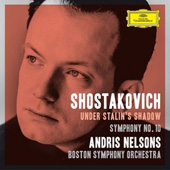

Viewed from any number of various perspectives, it's obvious that this is a momentous release in the long and eventful history of Deutsche Grammophon. This recording of the
Symphony No. 10 in E minor, Op. 93 by Dmitri Shostakovich (1906-1975) is the first as part of a multi-year recording partnership between Deutsche Grammophon,
conductor Andris Nelsons, and the Boston Symphony Orchestra. A great number of excellent recordings were produced during earlier encounters between
DG and Boston, mostly from the times when Michael Tilson Thomas and Seiji Ozawa were conductors there. And now the BSO, one of the world's finest orchestras, have acquired themselves a
top ranking and musically intuitive conductor. Andris Nelsons already has many fine recordings under his belt that substantiate his credentials. Two of my own reviews of his
recordings on the Orfeo label can be read (here) and (here).
Stalin died on March 5, 1953. This event seems to have given Shostakovich the much needed impetus to write a new symphony within a matter of months. The 10th saw its première on December
17th of that year. It was composed a long eight years after the 9th because he and other composers had seen their expressive freedoms curtailed by the Soviet authorities for writing dissonant and
cynical music. The new symphony was written in response to Stalin's death, and does seem to dredge up some dark and tragic emotions from the past, but ends, in typical Shostakovich fashion,
on a very jubilant if somewhat sardonic note.
Andris Nelsons said: "I could not live without the music of Shostakovich. I'm sure it has something to do with having grown up in the Soviet Union. I can't entirely explain why I have such an
intimate relationship with his music, but I feel like I know him, in a mystical way." He certainly projects the underlying atmosphere of the music very well. Just listening to how he shapes
the sound of the double basses and cellos in the dark and brooding opening of the first movement is enough to convince anyone that this conductor does not study a score superficially. He takes
his time and allows the music itself to lead the way. His reading of the first movement alone is 3 minutes longer than the highly respected Karajan Berlin recording on the same label. The melancholy
clarinet or flute passages, the outbursts of emotion, the distant martial snare drum ... all of these highly typical Shostakovich gestures are well captured and expressed by Nelsons. There is certainly
no relent in his push forward and manic run-through of the violently nervous Scherzo second movement. The blaring brass, high pitched flute and piccolo trills, and pounding percussion, all contribute
to the overwhelming sense of fear. It's believed that this movement was a portraiture of the violent nature of Stalin. The musicians of the BSO definitely flex their muscles in this brief but powerful
statement. The following Allegretto movement offers some relief as it opens with a slow, lilting dance rhythm, but again slips quickly into a kind of wistful melancholy with brief outbursts
in which, for the first time, Shostakovich used his personal motto, D-E flat-C-B, which represents his initials, DSCH. The subtleties and sous-entendres are well delineated by Nelsons,
and his overall delivery adds a sense of malicious mystery to the whole movement. The desolate chill that opens the final movement is perfectly achieved by the BSO members, then suddenly
around five minutes in the tempo picks up and the mood brightens and leads to a loud and broad declamation of the composer's motto at which point the mood darkens again. A lyrical melody
for strings alone takes over briefly until such point where the snare drum introduces the first strands of the jubilant coda in which the music's overall circus atmosphere swirls around loud and
heavy statements of Shostakovich's personal motto as if declaring: "I've beat you in the end!"
The recorded sound is superb all around. I didn't even realize that this was a "live" recording until I heard the energetic applause instantly rise up after the hair-raising finale.
2016 Grammy Award winner and Gramophone Award winner for Best Orchestral Recording of the year.
Below is a short video of a segment of the manic second movement, live from Carnegie Hall.
Jean-Yves Duperron - August 2015